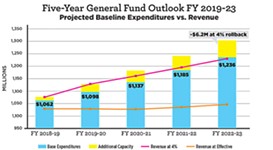Point Austin: Step Up to Citizenship
The curtain rises on the annual budget pageant – places, please
By Michael King, Fri., June 25, 2010

That's not to say we won't have another tough budget year – not quite as bad as last year's recessionary swan dive, but still treading water to cover all the city's structural costs without sinking under the effort. In these parts we're often reminded how much more fortunate we are than many other municipalities, in Michigan or Florida or California, where the rapidly declining tax base has made even basic needs go begging. For us, this will be the recently rare year of moderately declining property values, which makes the property tax rate calculations more difficult even as regional sales tax receipts have slowly begun to rebound.
Because it's still a lean year, City Council is virtually certain not to venture beyond the rollback tax rate; but it's worth reminding ourselves that when times were good, a series of councils declined to ask the public to support a bigger tax bite in order to get ahead of both basic expenses (from cops to parks to libraries) and continuing growth. Now we're seeing the predictable results, from lengthening emergency response times to overwhelmed parks and swimming pools – with neither reserves nor a rising tax base to cover the difference.
This year's mantra? Like baseball's: Better luck next year.
Choose Your Bullhorn
Nonetheless, now is the time for public-spirited citizens to engage in the discussion and to provide substantive feedback on the cuts and needs priorities developed by the departmental staff. The city has developed both online and public-meeting methods for Austinites to provide feedback, although there's no strictly scientific way of getting that done. As always, a handful of people are mightily engaged on their particular preoccupations, while far too many ignore the entire process until their own neighborhood or interest-group ox has already been gored.
Generally among the loudest advocates are the "public safety" warriors, ranging from neighborhood crime watchers to sober-sided criminal justice scholars. It's often presumed that "the public" invariably wants more and more police; yet at the Convention Center public budget forum, the participants voted both to reduce overtime for current officers ($1.2 million savings) and to delay by a year the 2011 cadet class ($1.4 million). One could argue that those are effectively self-contradicting votes among a self-selected group of citizens, but even as a straw poll it certainly doesn't suggest mass enthusiasm for the 500 more cops Austin Police Chief Art Acevedo told the Public Safety Commission the city needs for effective service.
The commission itself recommended adding 100 new officers over the next year. We know this because in a more prominent instance of citizen engagement, Chair Michael Lauderdale and Vice Chair Michael Levy bought full-page Statesman ads Sunday and Monday to publish the commission's report, spending between them a considerable five-figure sum to suggest readers lobby council members on behalf of the PSC's priorities. (The one other commissioner who got back to me said he learned of the ad when he opened his paper.)
Setting aside for the moment the PSC's specific recommendations – beyond more police, it unsurprisingly endorses more EMS stations and more firefighters – does this mark a new era in the boards and commission system, in which members will go over the heads of the council that appointed them and campaign directly to the public? My guess is not likely – unless all the other B&C chairs suddenly sprout Levyesque deep pockets.
Diminishing Returns
For what it's worth (not much), Acevedo told the First Unitarian Universalist Church's public forum audience Sunday morning that the city's recent implementation of the Austin Regional Intelligence Center initiative will mean that the department will be "able to do more with less." If you think that means 500 more cops might be a bit much or that public safety will soon be taking up less than the 66% of the general funds budget that it currently demands, I wouldn't hold my breath.
I asked Levy where in the other third he thought we might find the funds for additional police. "If they want to find the money, they can find it," he replied. "They have dozens of [public information officers] and spin doctors and that $5 million they spent last year on planning for their trolley." I doubt you could squeeze 50 (let alone 500) cops from the juice of two dozen junior flacks and a brace of transit planners, but delusion springs eternal from the devoted fans of Law & Order: Budget Warriors Unit.
Whatever your perspective, the larger lesson here is that the annual bloodletting has begun, and if you want to get your licks in on your favorite (or least favorite) public expenditures, now is the time to join the queue. Dunbar has provided a thumbnail sketch of the likeliest choices and the broader issues involved, and he'll be tracking the public discussion on into midsummer. A perennial complaint is that the city's proposed cuts (as well as unmet service needs) present only a small fraction of the entire city budget (including the revenue-producing "enterprise" departments). Dunbar will certainly be examining that supposition, and it's worth the debate.
But in my experience, it's also worth noting that most of the ongoing expenses of running Austin are exactly that: structural expenditures required to keep public infrastructure, assets, and amenities in good functioning condition. Especially in Texas, our problem – whether you're a fan of parks, pools, libraries, firefighters, or police – has not been that we just spend too much money on government.
Got something to say on the subject? Send a letter to the editor.










